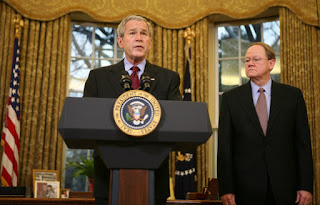| By Jim Garamone American Forces Press Service WASHINGTON, Feb. 14, 2008 – The Navy will shoot down a malfunctioning U.S. spy satellite sometime after Feb. 20, government officials said during a Pentagon news conference today. |
“The likelihood of the satellite falling in a populated area is small, and the extent and duration of toxic hydrazine in the atmosphere would be limited,” Jeffrey said. “Nevertheless, if the satellite did fall in a populated area, there was the possibility of death or injury to human beings beyond that associated with the fall of satellites and other space debris.”
The window for shooting down the satellite opens in the next three or four days and remains open for as many as seven or eight days, said Marine Gen. James E. Cartwright, vice chairman of the Joint Chiefs of Staff.
NASA Administrator Michael Griffin said the study group looked carefully at increased risks to the shuttle and International Space Station and decided they are negligible. “We are very comfortable that this is a decision made carefully, objectively and safely,” Griffin said.
Still, the Navy will not fire until after the shuttle Atlantis mission ends Feb. 20.
In late January, the U.S. government notified other nations that the satellite was unresponsive and would make an uncontrolled reentry in late February or early March.
The Navy has modified three SM-3 missiles aboard Aegis ships to strike the satellite, Cartwright said. The Navy wants to intercept the satellite at a point just above the atmosphere so there would be a high likelihood of bringing it down in an unpopulated area. An intercept also would rupture the hydrazine tank. The vice chairman would not say exactly where the ships would fire from, only saying it will be from the northern hemisphere and the Pacific Ocean.
Intercepting the satellite at about 130 nautical miles altitude will reduce the risk of debris in space. Once the satellite is hit, officials hope 50 percent of the debris will come to Earth in the first two orbits and the rest shortly thereafter, Cartwright said.
The satellite belongs to the National Reconnaissance Office and was launched Dec. 14, 2006. It weighs roughly 5,000 pounds, and computer models show that roughly 2,800 pounds would survive reentry. “What is different here is the hydrazine,” Cartwright said. “In this case, we have some historical background that we can work against for the tank that contains the hydrazine. We had a similar one on Columbia that survived reentry. We have a pretty reasonable understanding that, if the tank is left intact, it would survive the reentry.”
The tank is circular with a radius of 20 inches. It holds about 1,000 pounds of the fuel.
While details of the satellite are classified -- DoD officials will not release who built it or how much it costs -- that had no bearing on the decision to shoot it down, Cartwright said. The temperatures from reentry would burn up any classified system on the satellite, he said.
Hydrazine is similar to chlorine or ammonia in that it affects lung tissue. People inhaling it would feel a burning sensation. “If you stay close to it and inhale a lot of it, it could be deadly,” Cartwright said.
If the military did not shoot down the satellite, the hydrazine would disperse over an area roughly the size of two football fields, the general said. Those who breathed it would need medical attention.
“As we reviewed the data, if we fire at the satellite, the worst that could happen is that we miss,” Cartwright said. “Then we have a known situation, which is where we are today.”
Grazing the satellite would probably still bring it down quicker and more predictably, he said. “If we hit the hydrazine tank, then we’ve improved the potential to mitigate that threat,” he said. “The regret factor of not acting clearly outweighed the regret factor of acting.”
Biographies: Tags: James F. Jeffrey and Michael Griffin or Gen. James E. Cartwright and Navy to Shoot Down Malfunctioning Satellite











